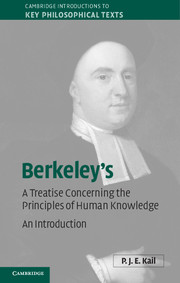Book contents
- Frontmatter
- Dedication
- Contents
- Acknowledgements
- Chapter 1 Introduction
- Chapter 2 Context and aims
- Chapter 3 The Introduction to the Principles
- Chapter 4 The argument for immaterialism
- Chapter 5 Against the philosophers: the refutation of materialism
- Chapter 6 Reality and God
- Chapter 7 Science and mathematics
- Chapter 8 Spirits
- Bibliography
- Index
- References
Chapter 7 - Science and mathematics
Published online by Cambridge University Press: 05 June 2014
- Frontmatter
- Dedication
- Contents
- Acknowledgements
- Chapter 1 Introduction
- Chapter 2 Context and aims
- Chapter 3 The Introduction to the Principles
- Chapter 4 The argument for immaterialism
- Chapter 5 Against the philosophers: the refutation of materialism
- Chapter 6 Reality and God
- Chapter 7 Science and mathematics
- Chapter 8 Spirits
- Bibliography
- Index
- References
Summary
Introduction
In the sequence of sections §§34–84, Berkeley considers a host of objections to his system. Some of these we have already discussed while addressing other topics, such as continuity. Other objections concern the compatibility of Berkeley’s system with orthodox religion. He considers, to give a couple of examples, the claim that the existence of matter is supported by the Bible (PHK §82) and whether his system allows for miracles (PHK §84). Yet another family of objections represents various attempts to rehabilitate the notion of material substance (PHK §§67–81). We shall not, however, consider these objections nor Berkeley’s replies to them; instead, we shall consider objections, contained in PHK §§50–66, that concern the compatibility of immaterialism with the practice of science. Berkeley is acutely aware that the rise of modern science is a point of pride for the philosophers of the period, and that immaterialism seems to threaten its very intelligibility. His replies to these objections inform a general account of the practice of science developed later in the Principles, an account he views as superior to that available to materialism. He also thinks that his philosophy is advantageous to the formal science of mathematics.
- Type
- Chapter
- Information
- Berkeley's A Treatise Concerning the Principles of Human KnowledgeAn Introduction, pp. 116 - 131Publisher: Cambridge University PressPrint publication year: 2014



